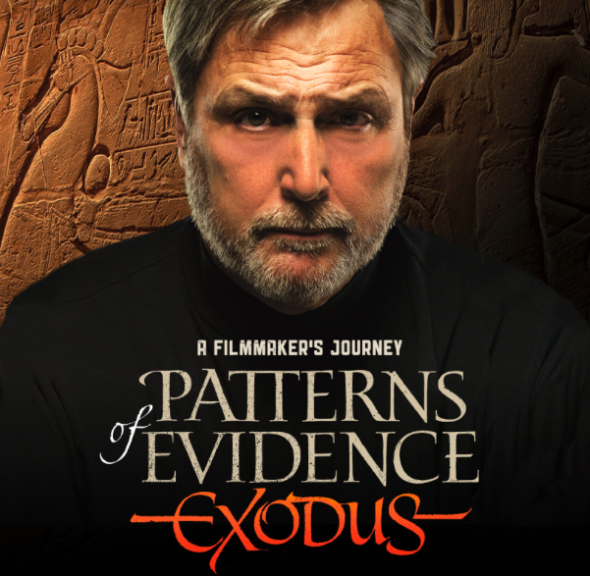Inspirations|December 30, 2014 04:47 EST
Exodus Expert Weighs in on Controversy Surrounding Ridley Scott's 'Exodus: God's and Kings' Film [INTERVIEW]

With the release of Ridley Scott's controversial Film 'Exodus: God's and Kings' BREATHEcast caught up with exodus expert Timothy Mahoney to discuss his thoughts on the film compared to his findings.
Mahoney is set to release a new documentary titled 'Patterns of Evidence: Exodus', that chronicles an in-depth archaeological investigation in Egypt as his team attempts to confirm the biblical text. See below what Mahoney had to say about the Hollywood blockbuster in comparison to the evidence he found.
BREATHEcast: Did Ridley Scott try to stick to scripture or any of the things that you researched or discovered?
Timothy Mahoney: Some of the basic plot points of GODS AND KINGS are similar to the story in the Bible, but there are also a couple big themes and many of the details that have been changed. In Ridley Scott's film, just as recorded in the Bible, there was a people group known as the Israelites who lived under the hardship of slavery in ancient Egypt who Pharaoh eventually let go after a series of devastating plagues.
What I found out in the research, which we have covered in the film 'PATTERNS OF EVIDENCE: THE EXODUS' and the upcoming book of the same name, was that there is archaeological evidence of a very large population of Semitic people living in the very area that the Bible states the early Israelites settled in - the eastern Nile Delta in the location of the city of Ramses. In fact, it was one of the largest cities in the ancient world - a city of Semites in the middle of Egypt. But these people lived there much earlier than would be expected, and earlier than the time of Ramses when there is no evidence for such a group.
The archaeology reveals that these people began prosperous and, according to Egyptologist Manfred Bietak, had been allowed to come into the land by the Egyptian crown. But over time these people ended up in hardship, with a sharp decline of lifespan. This certainly fits the idea of the Israelites being free during the life of Joseph and then becoming enslaved. Additionally, the infant mortality rate at this city became much higher then other cemeteries in the ancient world. According to the dig report, when all the children's graves aged ten and younger were identified, it was found that nearly 50 percent died in the first three months of life.
I had to consider that perhaps this was just an epidemic that hit the newborns especially hard. But Egyptologist David Rohl told me that when the graves of those who made it to adulthood were examined, it was seen that there were 60 percent females to 40 percent males. The reduction appears to have been in the male side of the population. So could this massive increase in infant burials be evidence for the killing of male Israelite children?
BC: In your film, 'Patterns Of Evidence: The Exodus' you reveal that Ramses might not have been the pharaoh of the Exodus. The Hollywood blockbuster however uses Ramses as the Pharaoh. Why do you think people have adapted the popular view that Ramses was the pharaoh at the time of the Moses?
TM: I asked Egyptologist James Hoffmeier that very question. He said that the key to that theory is the building of the city of Ramses by the Israelite slaves mentioned in Exodus 1:11. And since we know that Ramses II built a great city by that name, scholars link the Exodus to the time when the archaeology shows that city was active - basically between 1300 and 1100 BC.
Ramses II was perhaps the most famous king in Egypt's history and not only did he build that grand city and name it after himself, he ruled huge empire, which makes him an attractive opponent for Moses to confront in dramatizations of the story. That's why Ridley Scott's film cast him as the pharaoh of the Exodus and emphasizes the extravagant building projects that went on during his reign. GODS & KINGS actually follows a long list of other Exodus movies that also use Ramses as the villain. This is also the majority view of scholars today.
BC: In the Bible account the Red Sea parts, and there is a burning bush, but in 'Exodus: God's and Kings' the sea recedes and a bush sways but does not burn. Perhaps this is alluding that science was behind the miraculous effects. Is there any proof of those instances and whether or not it supports the Bible's account?
TM: A burning bush in the middle of a vast wilderness would not likely leave any remains behind that we could find and study today. But science can be used to investigate certain aspects of the story. Whether there was this monumental event called the Exodus that involved massive numbers of people, a devastation of Egypt, and the burning of specific high-walled cities in Canaan - and whether that event send ripples through time to effect us today - the question of whether that really happened or not is essentially a historical question. And we can use science to see whether there is hard evidence to support that account or not.
BC: 'Exodus: God's and Kings' casting an all-white cast caused a bit of controversy. Do you think the Israelites and Egyptians back then would have looked any different then, then they do today?
TM: Interestingly, we do get some insight into this issue by looking in Egyptian tombs. In ancient times people of different races - Egyptian, African and Semitic - were depicted on the tomb walls in different shades. This can be seen in the tomb of Rekhmire, an ancient Egyptian noble. In his tomb we can see POWs, Semites from both Canaan and Syria, working alongside prisoners of war from Nubia, black Africans. And there they are making bricks, overseen by Egyptian taskmasters with sticks, just as the Bible mentions. In these scenes the tomb artist painted each of these groups according to their skin color. The Africans were dark, the Egyptians were brownish red and the Semites were more pale yellow.
Stay tuned for part 2 of our interview with Mahoney coming soon. 'Patterns of Evidence: Exodus,' will be presented in 600 select U.S. cinemas by Fathom Events and Thinking Man Films on January 19, click HERE for more information.












